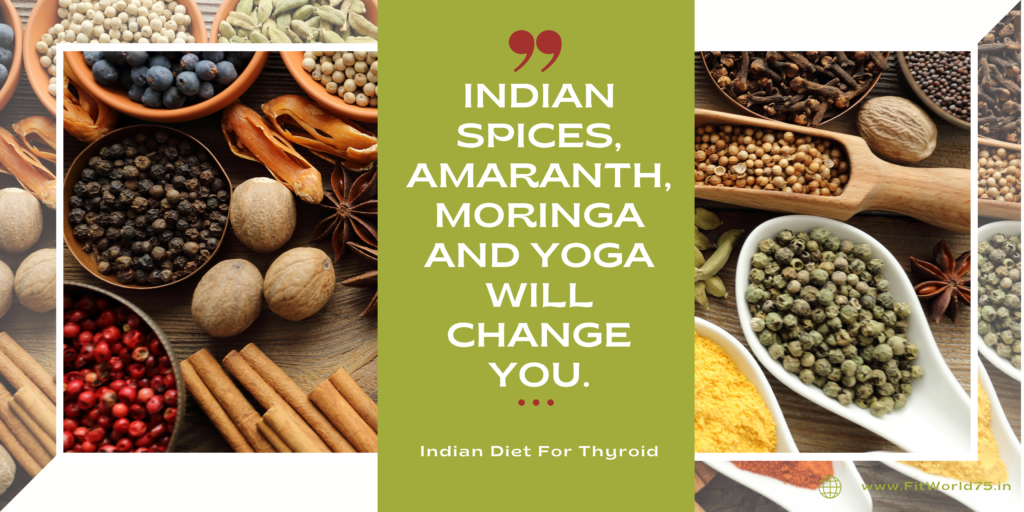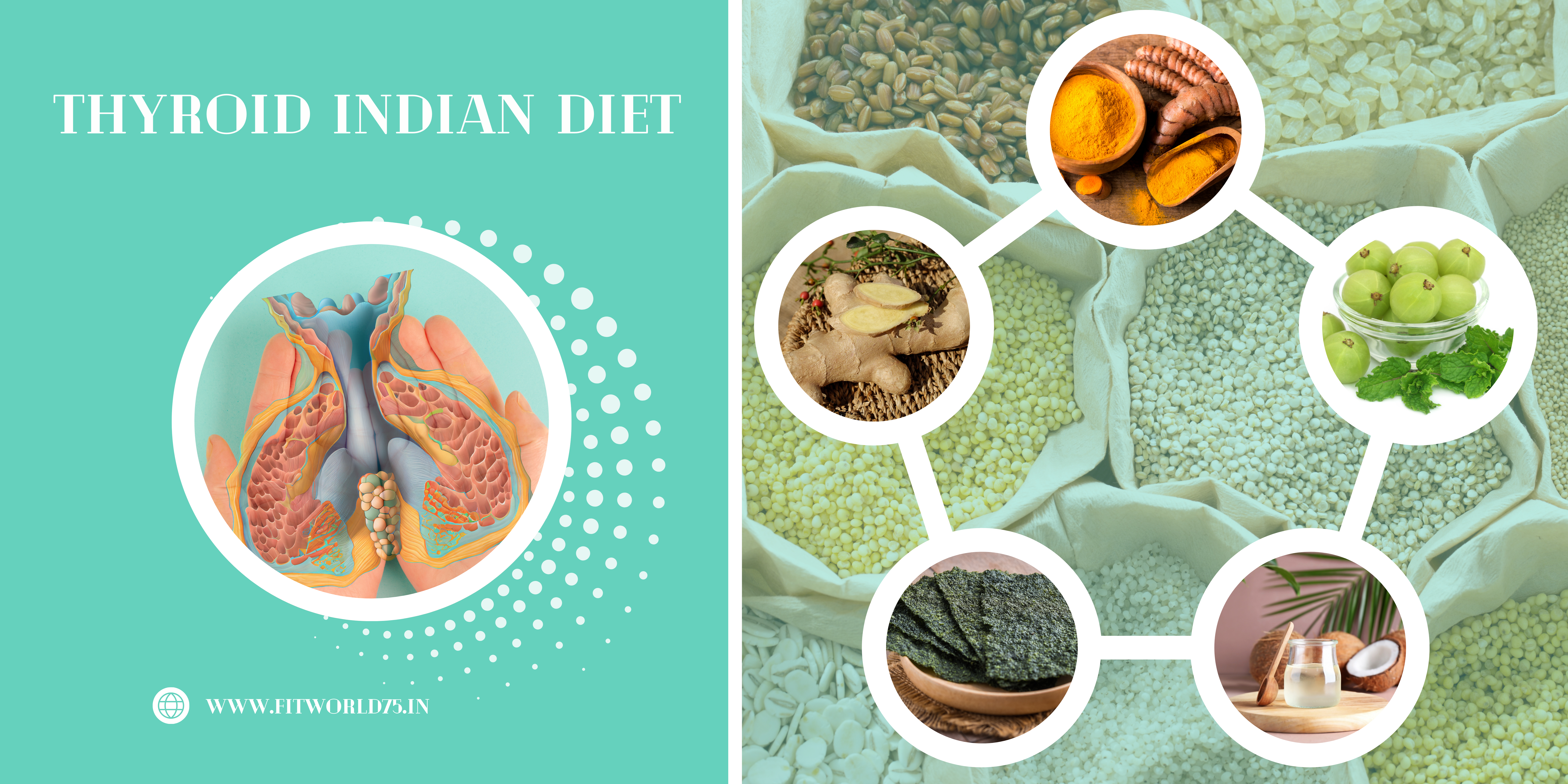Introduction
The thyroid gland is an important biological organ that controls how our bodies use energy. Thyroid problems are becoming more common in India, which means that people need to pay more attention to what they eat. The “Thyroid Indian Diet Chart: Eat Right, Get Fit!” is meant to give people the tools they need to take charge of their thyroid health by making smart food choices.
Understanding Thyroid Disorders
India doesn’t pay much attention to thyroid health. This gland affects the body’s metabolism, energy levels, and health in general. Hypothyroidism and hyperthyroidism are common conditions that affect a lot of people, so managing your food is very important.
Principles of a Thyroid-Friendly Diet
A thyroid-friendly diet focuses on minerals and vitamins that are important for thyroid health, like iodine, selenium, and zinc. It’s also important to stay away from foods like soy and processed foods that may harm thyroid health.
Table of Contents
The Indian Diet and Thyroid Health
The traditional Indian diet, which is packed with grains, beans, and veggies, may be good for your thyroid. But it needs to be changed in some ways, like cutting down on goitrogenic foods (foods that can mess up thyroid function), to make sure it’s safe for thyroid patients.
Thyroid Indian Diet Chart: A Detailed Guide
This guide gives you personalized food ideas that include a variety of Indian dishes and put thyroid health first. It has different breakfast, lunch, dinner, snack, and drink choices that were all picked because they are good for thyroid health.
How to Add Superfoods to Your Diet
There are many superfoods in Indian food, such as turmeric, moringa, and amaranth, which are great for thyroid health. These are simple things that can be added to everyday meals to make them healthier.
- Moringa
- Amaranth
The Role of Spices and Herbs in Thyroid Health
In Indian cooking, spices and herbs do more than just add flavor; they are also very good for you. Ginger, turmeric, and fenugreek are some of the foods that can help your thyroid work better.
- Ginger
- Turmeric
- Fenugreek
Portion Control and Meal Planning
Controlling your portions is an important part of taking care of your thyroid health. This article gives useful advice on how to control your portions and plan meals that will work well. Traditional Indian meals can be large. Practice portion control to maintain stable blood sugar levels and support metabolism. Eating smaller, more frequent meals can help prevent energy crashes. This way, the thyroid Indian diet is useful and will start showing effects in no time.
Dealing with Dietary Restrictions
This part talks about common dietary limits and gives vegetarian, vegan, and other specialized diet followers options and ideas.
- Goitrogenic Foods: Broccoli, cauliflower, cabbage, and other typical Indian vegetables can have an adverse effect on thyroid function. These veggies can have less of an impact on goiter formation if cooked or steamed. If you want to help your thyroid function, you might want to try cooking with iodized salt.
- Processed foods: Indian desserts and snacks may have a lot of added sugar and hydrogenated oils. Substitute roasted chickpeas or almonds for these unhealthy snacks and cut back on your intake of them.
- Customize Traditional Recipes: Make adjustments to classic dishes to accommodate special diets. For example, try making rotis or chapatis with gluten-free flours, switching out dairy for non-dairy alternatives in curries, and getting creative with spices that support the thyroid.

Lifestyle and Dietary Changes
A holistic approach to thyroid health includes things like managing stress and working out regularly. This part stresses how important these things are in addition to food.
Integrating Yoga and Pranayama:
- Begin with a gentle warm-up, including neck and shoulder stretches.
- Practice yoga poses for thyroid health, focusing on proper alignment and breathing.
- After your yoga session, sit comfortably and practice pranayama techniques for stress management.
- Dedicate at least 20–30 minutes to your yoga and pranayama practice each day.
- Listen to your body and avoid overexertion; yoga should be a calming and rejuvenating practice.
Monitoring Your Progress
Keeping a food log can help you figure out how your diet affects your thyroid health. In this part, we also talk about how important it is to get qualified assistance from nutritionists.
Conclusion
At the end of the piece, it is emphasized how important it is to take a complete approach to managing thyroid health, which includes food, lifestyle changes, and medical advice.
“Thyroid Indian Diet Chart: Eat Right, Get Fit!” is a complete guide to taking care of your thyroid health with a diet that is specially made for Indian tastes. This way of doing things emphasizes how traditional Indian foods and spices can help keep your thyroid healthy while also using new nutritional knowledge to make things even better.
Frequently Asked Questions
What foods should I avoid on a thyroid Indian diet?
Avoid foods that make your goiter worse, like raw green veggies (like broccoli and cabbage), soy products, and gluten. For better thyroid function, you should also limit foods that are highly processed, high in sugar, and have a lot of caffeine.
Can spices affect thyroid health?
Yes, a couple of spices can be good for your thyroid health. Turmeric, for example, can help with digestion and reduce inflammation, which are both good for people with thyroid problems.
Is it necessary to eliminate dairy and wheat from a thyroid diet?
It’s not always needed, but for some people, it can be helpful. Cutting back on dairy and gluten may help you control your symptoms if you have allergies or autoimmune thyroid conditions like Hashimoto’s.
How does a vegetarian adapt the Thyroid Indian Diet Chart?
For protein, vegetarians can eat a lot of veggies that are high in fiber, lentils, and dairy products if they are not allergic. To keep your thyroid healthy, a varied diet should include nuts, seeds, and vegetables.
Are there any specific superfoods recommended for thyroid health?
In fact, superfoods like flaxseeds, seaweed (which is high in iodine), and nuts (especially Brazil nuts, which are high in selenium) are great for helping the thyroid work.
How often should meals be eaten on this diet?
To keep your blood sugar levels steady, try to eat smaller meals more often. People who have problems with their thyroid should usually eat every three to four hours.
Can lifestyle changes complement the Thyroid Indian Diet?
Absolutely. In addition to a healthy diet, regular exercise, learning how to deal with stress, and getting enough sleep are all very important for thyroid health.
Is the Thyroid Indian Diet helpful for both hypothyroidism and hyperthyroidism?
Yes, with some modifications. Although the fundamental concepts are the same, those with hyperthyroidism may require more calories, while those with hypothyroidism should prioritize meals that increase metabolism.

